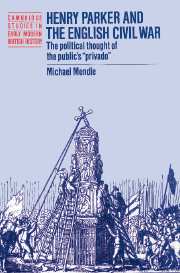Book contents
- Frontmatter
- Contents
- Preface
- Acknowledgments
- List of abbreviations
- 1 The public's privado
- 2 The ship money case and The Case of Shipmony
- 3 Religio laici
- 4 Observations and the political theory of the emergency
- 5 The Observator observed
- 6 “Vaine Confidence in the Law”: the Observator responds
- 7 Diverse urgent emergent considerations
- 8 Disputable and visible politics
- Conclusion: contrary points of war
- Appendix: The writings of Henry Parker
- Index
- Cambridge Studies in Early Modern British History
6 - “Vaine Confidence in the Law”: the Observator responds
Published online by Cambridge University Press: 08 October 2009
- Frontmatter
- Contents
- Preface
- Acknowledgments
- List of abbreviations
- 1 The public's privado
- 2 The ship money case and The Case of Shipmony
- 3 Religio laici
- 4 Observations and the political theory of the emergency
- 5 The Observator observed
- 6 “Vaine Confidence in the Law”: the Observator responds
- 7 Diverse urgent emergent considerations
- 8 Disputable and visible politics
- Conclusion: contrary points of war
- Appendix: The writings of Henry Parker
- Index
- Cambridge Studies in Early Modern British History
Summary
Observations opened the flood gates to a new kind of political reflection. The royalist counterattack and even the less than enthusiastic response that Observations received in some parliamentary circles raised a question: would Observations be swept away by torrents of its own making? Twice Parker gave in to the urge to answer his critics, first in an occasional pamphlet, The Contra-Replicant, which Parker used as a vehicle for the expression of a far broader set of concerns (which he further developed in The Oath of Pacification), and later in Jus Populi, Parker's most extended excursion into speculative political thought.
The Contra-Replicant was a pièce de cirConstance. At a time when Parker's behind-the-scenes activities at the Committee of Safety would have been easily more than one man's labor, a well-conceived and quite massive royalist “peace” campaign to stir up trouble in London drew Parker back into the public fray. As Parker later remembered the situation, “About the beginning of 1643 [actually December 1642–January 1643] another black desperate designe against the City of London was discovered, scarce inferiour to any of those former impregnations of the Kings inraged brain.” The urgency of the mission was not only political. The peace campaign's slogans pierced Parker'sown flesh; in reaction The Contra-Replicant allowed itself an unusually long tether, and proved to be amongst the most impassioned and self-revelatory of Parker's writings.
- Type
- Chapter
- Information
- Henry Parker and the English Civil WarThe Political Thought of the Public's 'Privado', pp. 111 - 136Publisher: Cambridge University PressPrint publication year: 1995



